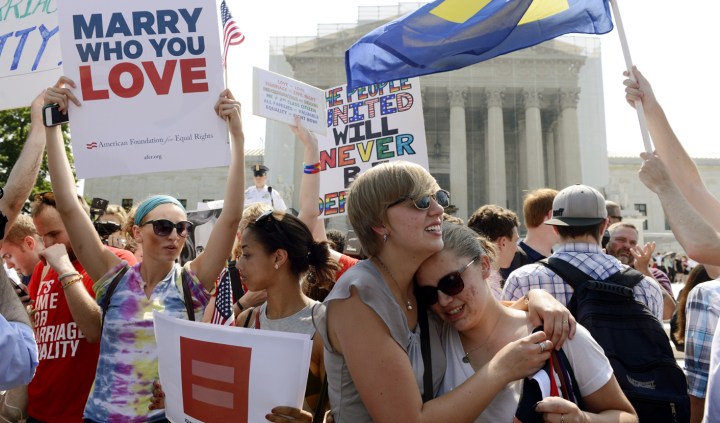World
US Supreme Court to settle gay marriage issue, once and for all

The US Supreme Court has decided to add a surprise to the American political system that could have interesting impacts on the presidential selection process – besides the possibility of a major societal change. J. BROOKS SPECTOR takes a look at this unexpected decision to tackle the vexed question of national legal acceptance of same-sex marriage.
We are just two weeks into a new year, but, already, some very interesting things are stirring in American politics and society. Within the past week, the preliminary stages of the Republican presidential nomination process for the 2016 election has already received a sizeable jolt with the likely entry, yet again, of Mitt Romney into the hunt for this prize. Republican elders have been less than unanimous in their applause for this but Romney has shown his determination to see the process through to the end in previous years, so who knows. Meanwhile, in an effort to preclude the widely derided circular firing squad of 2012 with that year’s unremitting schedule of increasingly insalubrious debates all around the country, the Republican National Committee has decided to try to enforce a much more limited schedule of debates – with the first one set to take place in August 2015.
But the real shocker in the American political universe has been the US Supreme Court’s decision that it would take up the very vexed question of same-sex marriage. In addressing this issue, the best guess is that the oral arguments at the court are now likely to take place sometime in April, followed by the court’s ruling on the question by June.
Effectively, the court has agreed to rule on whether same-sex couples have a constitutional right to marry everywhere in America and to have those marriages recognised throughout the nation. Specifically, the court will be asked to overturn several lower court rulings, grouped together, that have effectively banned same-sex marriages in four states, and then to declare that, on a national basis, people can marry the partners of their choice, regardless of gender.
Back in 2013, the court had declined to take up the issue framed this way, even though it did issue its decision then to do away with a federal anti-gay marriage law. However, in retrospect, that decision paved the way for a number of lower court rulings around the US that came down in favour of same-sex marriage rights. When that 2013 appeal was being heard, only a dozen states and the District of Columbia permitted same-sex marriages. But, in the interim, that number has now grown to some thirty-six states that sanction such marriages, largely because of lower court rulings coming down in favour of the right. Cheering on the court’s decision to hear the case, James Esseks, leader of the American Civil Liberties Union’s same-sex marriage efforts, told media, “The country is ready for the freedom to marry today.”
Specifically, the four appeals that will be grouped together by the Supreme Court for their decision this year have come from gay and lesbian plaintiffs in the states of Kentucky, Michigan, Ohio and Tennessee where the federal appeals court (a lower court than the Supreme Court) that covers those four states had upheld their same-sex marriage bans last November. These rulings reversed earlier pro-gay rights rulings of federal judges in those same states.
In fact, such a determination has actually been the only appellate court ruling against gay marriage since the Supreme Court had issued its 2013 decision nullifying the federal-level law. Late last year, five other states had also asked the court to preserve their bans on same-sex marriage, but the Supreme Court declined to do so. Its decision was issued without explanation (not entirely unusual when the court fails to agree to hear an appeal). Moreover, it also refused to block still other lower court rulings from taking effect in yet other states while the four state-appeals were pending. All of this has now clearly set the scene for the upcoming hearing on the four states to be heard in just a few months from now.
One of the actual Ohio plaintiffs, James Obergefell, told the press he was crying “tears of joy and sadness” after he learned the Supreme Court would be hearing his appeal. Two years ago, Obergefell had travelled to Maryland from Ohio with his dying partner, John Arthur, so that they could get married before Arthur passed away. The couple then sued Ohio to compel the state to list Arthur as married on his death certificate, thereby allowing the two persons to be buried next to each other. (Arthur died nearly a year and a half ago). Obergefell said, “I can’t wait to walk up those steps and have the Supreme Court understand that we’re just like everyone else.”
In the Kentucky case, Gregory Bourke and Michael Deleon have been partners for over thirty years. They were married in Canada eleven years ago and Bourke told reporters, “Our family is like any other family. We have children, we have jobs, we have lives, we are very much engaged in our community and yet we don’t feel like we are being treated yet as equal citizens.”
The federal government’s attorney general, Eric Holder, staked out the Obama administration’s position on this important case to urge the Supreme Court “to make marriage equality a reality for all Americans.” Meanwhile, of course, opponents of that position are not remaining silent. Rather, they are calling for the court to stand aside, letting an already-long-drawn-out political process on this question play out to the bitter end, rather than have the courts decide the issue with finality. Or, as Austin Nimocks, counsel for the anti-same-sex marriage advocacy body, Alliance Defending Freedom, responded after hearing of the court’s decision to hear the four-state appeal, “The people of every state should remain free to affirm marriage as the union of a man and a woman in their laws.”
The Supreme Court’s determination to hear this case and its possible far-reaching judgment is an indication of the strikingly rapid change in public acceptance (and growing support) for same-sex marriage in America. Survey data says even those who oppose same-sex marriage in America have largely come to accept the idea that it will become legal across the nation, sooner rather than later, despite their disapproval and the opposition of numerous politicians.
Looking back over the years on same-sex marriage decisions, while the court had upheld a Georgia anti-sodomy law in 1986, three later rulings, each written by Justice Anthony Kennedy (seen by some Supreme Court observers as the likely swing vote on the court for the upcoming case), were major victories for gay men and lesbians. In the most recent case, in 2013, the court struck down part of a federal anti-gay marriage law that has, in retrospect, now set the stage for a whole series of lower court rulings in favour of same-sex marriage rights.
In terms of the actual court process, this time around, for this case, the arguments before the court will get an extended hearing of two-and-a-half hours, versus the usual one-hour’s worth of oral argument time used in most cases the court agrees to hear. In contemplating this case, the Supreme Court justices will deal with two interconnected questions. The first is whether the US Constitution actually requires states to issue marriage licenses to same-sex couples. The other is whether states must also recognize same-sex marriages performed elsewhere. The court’s proceedings are not broadcast live on TV or radio, but some advocates on the subject are already pushing for that rule to be changed for this case.
Republican elders were at first deeply worried that if the court took up the case the court would agree to hear it in 2016, with a ruling by June, thoroughly riling up their contest for the presidential nomination. By contrast, it is unlikely any plausible Democratic Party candidate would oppose a ruling in favour of national recognition of same-sex marriage.
This case could also have important impacts on incumbent President Barack Obama’s search for a legacy. As Politico observed after the court announced its decision to hear the case, “The Supreme Court’s new move toward a definitive ruling on same-sex marriage could cement President Barack Obama’s claim to having presided over the most significant advances in gay rights in United States history.
“Obama’s term has already seen the enactment of a federal law protecting gays and lesbians against hate crimes, an end to the ban on openly gay members of the U.S military and the issuance of a Supreme Court ruling striking down the law banning federal recognition of same-sex marriage. Such unions have now spread to 36 states across the country. A new Supreme Court ruling declaring same-sex marriage rights guaranteed by the U.S. Constitution could serve as the capstone on a record of change unparalleled on any other issue in the public eye during his tenure.”
Moreover, the hearing and ruling coming in 2016 would have put the question right in the middle of the political battle for the nomination, likely adding a further note of unruly acrimony into the chase for the nomination – at least among Republicans. Coming in 2016, in turn, would have forced all putative GOP candidates to address specifically whether they supported the court’s decision and, if not, how would they respond to the significant number of social conservatives who have continued to oppose same-sex marriage and who simultaneously still have a disproportionate weight in Republican Party primaries and caucuses.
But now, with the ruling coming in 2015, potential candidates may possibly have time to finesse their response to a ruling – presumably in favour of same-sex marriage – well before the nomination chase is too far along. Still, assuming the court rules in favour of national acceptance with same-sex marriage, many of the Republicans’ likely candidates will still be challenged to find a way reconcile themselves with such a ruling, given their previous, respective statements of vociferous opposition to it. This will be in addition to the likely near-constant chivvying from the party’s social conservative base on the issue, because the party would need to find a way to articulate some kind of position advocating a roll back of such a ruling. This one will be really interesting to watch as it plays out in the coming months. DM
Photo: American University students Mollie Wagoner (2-R) and Sharon Burk (R), a same-sex couple that have been dating for a year, celebrate with supporters of gay and lesbian rights outside the Supreme Court after the ruling on California’s Proposition 8, in Washington DC, USA, 26 June 2013. The US Supreme Court struck down as unconstitutional a federal law that prohibits the US government from recognizing gay marriage and providing benefits to same-sex couples. EPA/MICHAEL REYNOLDS
Read more:
- Changing Attitudes on Gay Marriage at the Pew Research Center;
- Supreme Court sets stage for historic gay rights ruling at the AP;
- Will the Supreme Court cement Obama’s gay rights legacy? at Politico.



















 Become an Insider
Become an Insider